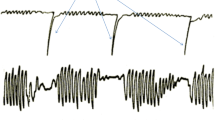Abstract
Mature albino rats were given extensive experience in approaching and feeding from a food cup upon its attachment to the home cage. In subsequent test trials, following 2, 4, 8, and 12 hours of fasting, the ongoing feeding response was interrupted by a loud sharp auditory signal of brief duration. Time taken to resume eating was automatically recorded. Mean log suspended eating time was found to relate negatively and reliably to hours of food-deprivation over the range of values examined. The results were interpreted as supporting the classic assumption that the vigor of approach behavior is positively related to drive strength.
Similar content being viewed by others
References
BOUSFIELD, W. A. & SHERIF, M. Hunger as a factor in learning. Amer. J. Psychol., 1932, 44, 552–554.
CICALA, G. A. Running speed in rats as a function of drive level and presence or absence of competing response trials. J. exp. Psychol., 1961, 62, 329–334.
CLARK, F. C. The effect of deprivation and frequency of reinforcement on variable-interval responding. J. exp. anal. Behav., 1958, 1, 221–228.
COTTON, J. W. Running time as a function of amount of food deprivation. J. exp. Psychol., 1953, 46, 188–198.
EDWARDS, A. L. Experimental design in psychological research. New York: Rinehart, 1960.
ESTES, W. K. Stimulus-response theory of drive. In M. R. Jones (Ed.), Nebraska symposium on motivation. Lincoln: Univer. Nebraska Press, 1958. Pp. 35–69.
HUNTER, T. A. An electronic contact relay. Amer. J. Psychol., 1952, 65, 458–459.
KING, R. A. The effects of training and motivation on the components of a learned instrumental response. Unpublished doctoral dissertation, Duke University, 1959. Cited by G. A. Kimble, Hilgard and Marquis’ conditioning and learning. New York: Appleton-Century-Crofts, 1961. Pp. 405–407.
MERYMAN, J. J. Magnitude of startle response as a function of hunger and fear. Unpublished master’s thesis, State University of Iowa, 1952. Cited by J. S. Brown, The motivation of behavior. New York: McGraw-Hill, 1961, Pp. 152–154.
MILLER, N. E. Shortcomings of food consumption as a measure of hunger; results from other behavioral techniques. Ann. N. Y. Acad. Sci., 1955, 63, 141–143.
MILLER, N. E. Effects of drugs on motivation: the value of using a variety of measures. Ann. N. Y. Acad. Sci., 1956, 65, 318–333.
SIEGEL, P. S. Food intake in the rat in relation to the dark-light cycle. J. comp. physiol. Psychol., 1961, 54, 294–301.
Author information
Authors and Affiliations
Additional information
This research was supported in part by the University Research Committee of the University of Alabama.
Rights and permissions
About this article
Cite this article
Siegel, P.S., Correia, M.J. Speed of resumption of eating following distraction in relation to number of hours food-deprivation. Psychol Rec 13, 39–44 (1963). https://doi.org/10.1007/BF03393499
Published:
Issue Date:
DOI: https://doi.org/10.1007/BF03393499




